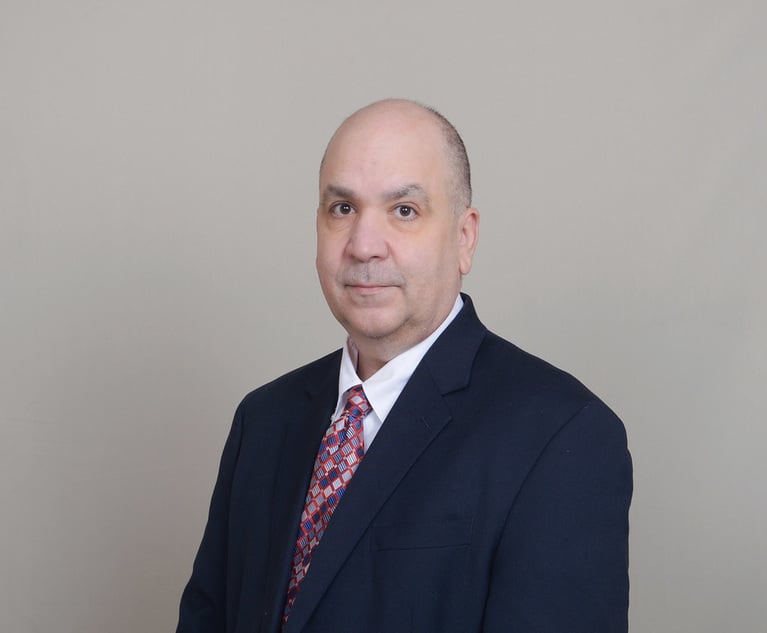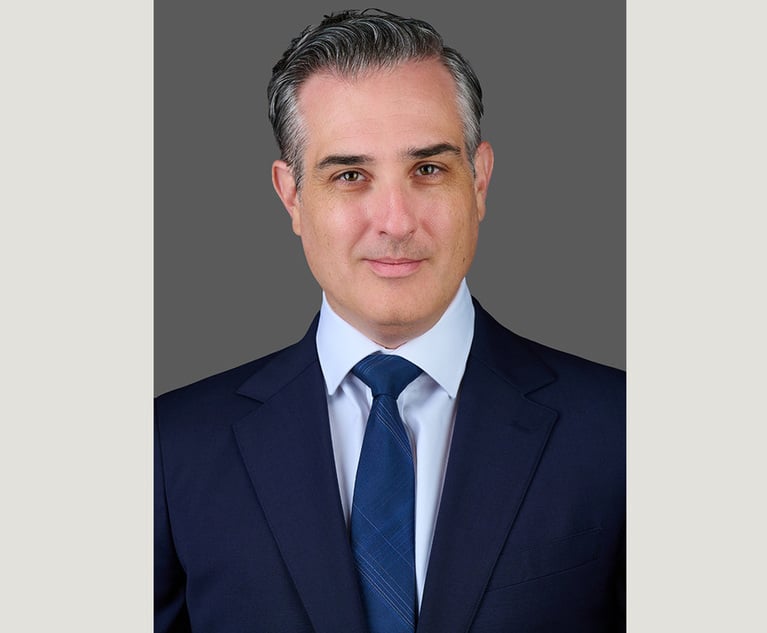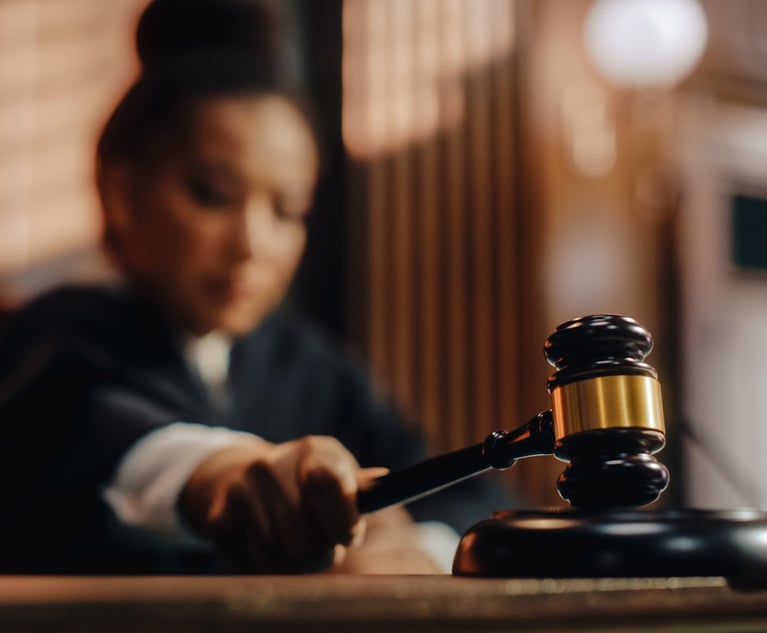Court: Attorney Doesn't Have to Return $65K Legal Fee to Estate
A Pennsylvania lawyer who was paid for legal services by the daughter of an incapacitated woman is under no obligation to return that money to the estate, despite an Orphans' Court's finding that the fee was paid using funds that were unlawfully transferred to the daughter.
February 20, 2020 at 04:30 PM
4 minute read
 Photo: welcomia/Shutterstock.com
Photo: welcomia/Shutterstock.com
A Pennsylvania lawyer who was paid for legal services by the daughter of an incapacitated woman is under no obligation to return that money to the estate, despite an Orphans' Court's finding that the fee was paid using funds that were unlawfully transferred to the daughter.
In In re Carol Shiner Rosenbloom, an Incapacitated Person, a three-judge panel of the Superior Court unanimously ruled Feb. 14 to vacate an order of the Allegheny County Orphans' Court requiring attorney Margie Hammer of Lieber Hammer Huber & Paul in Pittsburgh to return $65,000 in legal fees to the estate of her former client, Carol Shiner Rosenbloom.
In a memorandum opinion, Superior Court Judge Deborah Kunselman said Orphans' Courts have "no authority under the Probate, Estates, and Fiduciaries Code (PEFC) to force a person to give money to an estate, if, as here, the money does not belong to the estate."
Kunselman was joined by Judges John Bender and Dan Pellegrini.
According to Kunselman's opinion, the Orphans' Court, acting on a petition by the guardian of Rosenbloom's estate, determined that Rosenbloom's daughter Kate had exerted undue influence in convincing her mother to transfer investment accounts worth $283,000 to her.
The Orphans' Court ordered Kate to return that money to the estate, but also required Hammer to return $65,000 in legal fees Kate had paid her for work Hammer had done on behalf of Kate and Rosenbloom, according to Kunselman.
The Orphans' Court reasoned that it had not approved the payment to Hammer and that, since neither Hammer nor Kate could show that the fees were paid using Kate's money and not Rosenbloom's, the fee needed to be returned to the estate.
But the Superior Court panel said the Orphans' Court "did not find that attorney Hammer exerted undue influence over Ms. Rosenbloom, that she overcharged for her legal service, that she failed to render proper service, or that she in anyway defrauded Ms. Rosenbloom."
"Instead, the Orphans' Court relied on the argument of the guardian, namely that Kate's payments to attorney Hammer violated Section 5536(a) of the PEFC. We disagree," Kunselman said, noting that Section 5536(a) only gives the Orphans' Court authority over funds within the estate and not funds that lie outside "'the income or principal of the estate of an incapacitated person.'"
Kunselman said the section likewise does not permit the Orphans' Court to order payment of funds into an incapacitated person's estate from a third-party transaction.
"Here, the Orphans' Court ordered Kate to refund the full $283,000 to the estate, as an invalid, inter vivos gift from Ms. Rosenbloom to Kate," Kunselman said. "However, under Section 5536(a), the court could not go beyond Kate to recover estate funds that Kate may have subsequently transferred to third parties, including attorney Hammer."
Kunselman also said the $65,000 paid to Hammer was neither principal nor income of Rosenbloom's estate.
"Contrary to the belief of the orphans' court and the guardian, attorney Hammer had no obligation to petition that court to be paid for services to Kate and Ms. Rosenbloom, when those services predated the decree of incapacity and were paid for by Kate," Kunselman said. "Regardless of how Kate obtained the money she paid attorney Hammer, those funds had been passed to a third party and, thus, may not be acquired under Section 5536(a) of the PEFC."
Reached for comment, counsel for Hammer, James Lieber of Lieber Hammer, said, "The main thing is it's a fair decision and I was pleased that the Superior Court made clear what has always been clear, which is that the Orphans' Court has jurisdiction over the pertinent individual's estate but not over third parties."
Counsel for the guardian, Frederick Frank of Frank, Gale, Bails, Murcko & Pocrass in Pittsburgh, could not immediately be reached for comment.
This content has been archived. It is available through our partners, LexisNexis® and Bloomberg Law.
To view this content, please continue to their sites.
Not a Lexis Subscriber?
Subscribe Now
Not a Bloomberg Law Subscriber?
Subscribe Now
NOT FOR REPRINT
© 2025 ALM Global, LLC, All Rights Reserved. Request academic re-use from www.copyright.com. All other uses, submit a request to [email protected]. For more information visit Asset & Logo Licensing.
You Might Like
View All
People in the News—Jan. 9, 2025—Rawle & Henderson, Armstrong Teasdale
3 minute read


Phila. Court System Pushed to Adapt as Justices Greenlight Changes to Pa.'s Civil Jury Selection Rules
5 minute readLaw Firms Mentioned
Trending Stories
- 1Stevens & Lee Names New Delaware Shareholder
- 2U.S. Supreme Court Denies Trump Effort to Halt Sentencing
- 3From CLO to President: Kevin Boon Takes the Helm at Mysten Labs
- 4How Law Schools Fared on California's July 2024 Bar Exam
- 5'Discordant Dots': Why Phila. Zantac Judge Rejected Bid for His Recusal
Who Got The Work
Michael G. Bongiorno, Andrew Scott Dulberg and Elizabeth E. Driscoll from Wilmer Cutler Pickering Hale and Dorr have stepped in to represent Symbotic Inc., an A.I.-enabled technology platform that focuses on increasing supply chain efficiency, and other defendants in a pending shareholder derivative lawsuit. The case, filed Oct. 2 in Massachusetts District Court by the Brown Law Firm on behalf of Stephen Austen, accuses certain officers and directors of misleading investors in regard to Symbotic's potential for margin growth by failing to disclose that the company was not equipped to timely deploy its systems or manage expenses through project delays. The case, assigned to U.S. District Judge Nathaniel M. Gorton, is 1:24-cv-12522, Austen v. Cohen et al.
Who Got The Work
Edmund Polubinski and Marie Killmond of Davis Polk & Wardwell have entered appearances for data platform software development company MongoDB and other defendants in a pending shareholder derivative lawsuit. The action, filed Oct. 7 in New York Southern District Court by the Brown Law Firm, accuses the company's directors and/or officers of falsely expressing confidence in the company’s restructuring of its sales incentive plan and downplaying the severity of decreases in its upfront commitments. The case is 1:24-cv-07594, Roy v. Ittycheria et al.
Who Got The Work
Amy O. Bruchs and Kurt F. Ellison of Michael Best & Friedrich have entered appearances for Epic Systems Corp. in a pending employment discrimination lawsuit. The suit was filed Sept. 7 in Wisconsin Western District Court by Levine Eisberner LLC and Siri & Glimstad on behalf of a project manager who claims that he was wrongfully terminated after applying for a religious exemption to the defendant's COVID-19 vaccine mandate. The case, assigned to U.S. Magistrate Judge Anita Marie Boor, is 3:24-cv-00630, Secker, Nathan v. Epic Systems Corporation.
Who Got The Work
David X. Sullivan, Thomas J. Finn and Gregory A. Hall from McCarter & English have entered appearances for Sunrun Installation Services in a pending civil rights lawsuit. The complaint was filed Sept. 4 in Connecticut District Court by attorney Robert M. Berke on behalf of former employee George Edward Steins, who was arrested and charged with employing an unregistered home improvement salesperson. The complaint alleges that had Sunrun informed the Connecticut Department of Consumer Protection that the plaintiff's employment had ended in 2017 and that he no longer held Sunrun's home improvement contractor license, he would not have been hit with charges, which were dismissed in May 2024. The case, assigned to U.S. District Judge Jeffrey A. Meyer, is 3:24-cv-01423, Steins v. Sunrun, Inc. et al.
Who Got The Work
Greenberg Traurig shareholder Joshua L. Raskin has entered an appearance for boohoo.com UK Ltd. in a pending patent infringement lawsuit. The suit, filed Sept. 3 in Texas Eastern District Court by Rozier Hardt McDonough on behalf of Alto Dynamics, asserts five patents related to an online shopping platform. The case, assigned to U.S. District Judge Rodney Gilstrap, is 2:24-cv-00719, Alto Dynamics, LLC v. boohoo.com UK Limited.
Featured Firms
Law Offices of Gary Martin Hays & Associates, P.C.
(470) 294-1674
Law Offices of Mark E. Salomone
(857) 444-6468
Smith & Hassler
(713) 739-1250





